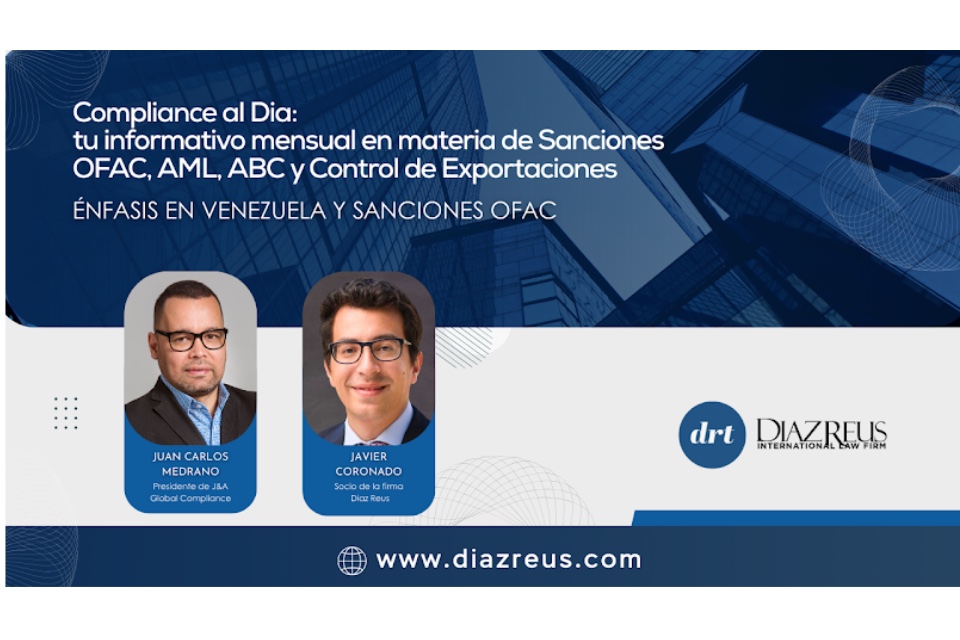By Xingjian “Jeff” Zhao | Partner Diaz, Reus & Targ, LLP
“Despite the recent political tensions and trade wars between the U.S. and China, it is comforting to see that these predatory litigation tactics will not refuge in our judicial system.”
Global Managing Partner
Diaz, Reus & Targ, LLP
Amid recent, intensifying tensions between the U.S. and China, Diaz, Reus & Targ, LLP (“DRT”) secured an unprecedented win for six Chinese e-commerce businesses in a Chicago courtroom. Led by the firm’s Global Managing Partner Michael Diaz, Jr. and Partner Xingjian “Jeff” Zhao, DRT’s intellectual property disputes team prevailed in a multimillion-dollar federal trademark infringement litigation, securing full and final dismissal of the entire lawsuit, with prejudice, through a successful motion to dismiss for insufficient service of process under the Convention on the Service Abroad of Judicial and Extrajudicial Documents in Civil and Commercial Matters (“Hague Convention”). The lawsuit was brought against the six AliExpress merchants, and nine hundred other sellers on e-commerce platforms, by Luxottica Group S.p.A., the Italian eyewear maker behind the “Ray-Ban” and “Oakley” brands, and its U.S. affiliate (collectively, “Luxottica”).
In the first decision of its kind, U.S. District Judge Joan B. Gottschall of the Northern District of Illinois began by observing that “[o]ver the past five years, this [C]ourt has presided over several similar cases brought against China-based operators of domains and online marketplaces allegedly selling counterfeit goods. In every case but this one, no defendant appeared, and default judgment was eventually entered.” Over the same period, scores of other trademark-waving plaintiffs have liberally corralled tens of thousands of mainly China-based retailers into U.S. federal trademark infringement lawsuits. Taking advantage of information asymmetry between the two countries, the plaintiffs usually seek upwards of $2 million in damages – the maximum statutory award under the Lanham Act – from each defendant for each alleged violation based on boilerplate claims about trademark infringement in online storefronts. Plaintiffs’ strategy typically revolves around holding the defendants’ assets hostage via rapid-fire filings of uncontested motions for temporary restraining orders (“TROs”) and preliminary injunctions. After a default is entered, all of the e-commerce sellers’ frozen assets would inure to plaintiffs to satisfy a multi-million-dollar statutory judgment for willful trademark infringement.
Here, DRT prevailed by obtaining a dismissal with prejudice for all six of its clients, despite having to navigate through what was already a legal minefield, created by the prior, uncontested entries of both a TRO and preliminary injunction in Luxottica’s favor, before the firm’s involvement. Generally, in U.S. civil litigation, service of process upon a Chinese corporation must be made in accordance with the strict formalities of the Hague Convention, which both the U.S. and China
signed and ratified decades ago. Luxottica claims to have served the six defendants by, without more, sending “the complaint, summons, and notice of the TRO to [their associated] email addresses[,]” which AliExpress provided to Luxottica under the Court’s previously issued TRO. DRT, on behalf of its six clients, moved to dismiss all counts on multiple grounds.
In relation to the service of process issue, to determine whether purported service on a foreign party under the Hague Convention passes legal muster, U.S. Supreme Court precedent requires that federal courts “refer to the internal law of the forum state.” The DRT defense team pointed out that its six clients, corporate entities located in Mainland China, cannot be served with process by email, due to China’s categorical objection to service by postal channels under Article 10(a) of the Hague Convention, as well as under Chinese domestic law barring plaintiffs in foreign proceedings from utilizing any service method that would circumvent the involvement of local P.R.C. authorities. The relevant Article states that service may be effectuated by mail or through a judicial official of the State of destination if the destination State does not object.
The Court agreed with DRT’s analysis of pertinent Chinese domestic law under Article 277 of the P.R.C.’s Code of Civil Procedure, which prohibits any “foreign agency or individual” from serving process within that country “without the consent of the in-charge authorities of the People’s Republic of China.” Such consent, in turn, can only be obtained by following the procedural formalities set forth in the Hague Convention.
Equally important, the Court sided with DRT and its clients in concluding, after a significant amount of briefing, that it is “persuaded by the [defendants’ cited] cases treating [China’s] Rule 10(a) objections [against permitting any service by postal channels under the Hague Convention] as precluding service by email. Because email would bypass the methods of service the Hague Convention authorizes, the Convention preempts it as inconsistent.” Since China categorically opposes all methods of service contemplated under Article 10 of the Hague Convention, and Article 10’s operation is contingent upon the forum state’s non-objection, the Court, citing cases, held that “China’s objections are substantially in the form of objections which courts have determined prevent service by email. These include objections communicated by Switzerland, Germany, and Mexico. China’s objections likewise preclude email service.”
These issues aside, Luxottica also sought to challenge the applicability of the Hague Convention itself, claiming that the Convention should not apply because it purportedly did not know of the defendants’ physical addresses. The Court quickly rejected this argument as missing the point. Citing a long line of authorities, the Court held that the Hague Convention should clearly apply. Indeed, “[a] plaintiff cannot close its eyes to the obvious to avoid the Hague Service Convention; the plaintiff must make reasonable diligent efforts to learn the defendant’s mailing address.” Luxottica has failed to do so here. For all of Luxottica’s qualms about its inability to discover defendants’ addresses, claims that initially led to the issuance of a TRO that had permitted service by email, “[e]vidence submitted by defendants in support of their motion to dismiss shows that plaintiffs neglected to mention an important source of information [t]he packing slips for the allegedly counterfeit products plaintiffs purchased bear return addresses in China.”
Plaintiffs cannot seek to make an end-run around the Hague Convention by, according to the Court, “shift[ing] the burden of proving proper service to defendants, faulting them for not representing explicitly that the return addresses are valid for service of process.” Merely possessing a supposed “generalized suspicion about an address’s validity does not make it ‘unknown’ under the Hague Service Convention . . . . the fact that defendants allegedly offer counterfeit goods for sale does not automatically mean that every address listed for them is invalid or that they are evading service of process.”
Shortly after the opinion was issued, the Court denied Luxottica’s motion for reconsideration. Judge Gottschall also approved of DRT’s position on several other important issues, which the firm raised on behalf of its clients during briefing on the motion to dismiss. “The TRO gave plaintiffs sufficient reason to believe that the manner of service authorized was adequate, but, like many such orders in similar cases, it was obtained ex parte and under seal[,]” the Court noted. After evaluating arguments and evidence advanced by DRT’s defense team on behalf of the Chinese e-commerce sellers, the Court concluded that the portion of its previously issued TRO permitting service of process by email “does not withstand scrutiny under full adversary briefing.
On January 15, 2020, the Court dismissed the case as to all of DRT’s clients, with prejudice.
The Court’s opinion granting DRT’s motion to dismiss is among the few decisions chosen for official publication in the United States National Reporter System’s Federal Supplement, at Luxottica Group S.p.A. v. Partnerships & Unincorporated Associations Identified on Schedule «A», 391 F. Supp. 3d 816 (N.D. Ill. 2019). DRT’s case has also been selected as the “Case of the Day” by Letters Blogatory, a top-ranked publication on issues of U.S. and translational procedural law, as recognized by the American Bar Association. Significantly, DRT’s success in this litigation has already influenced the law throughout the U.S., with federal district courts in other states reaching the same conclusions after approvingly adopting principles in Judge Gottschall’s opinion originally advanced by DRT. See, e.g., Anova Applied Elecs., Inc. v. Hong King Group, Ltd., No. CV-17-12291-FDS, 2020 WL 419518, at *1 (D. Mass. Jan. 24, 2020) (holding that “e-mail service on defendants [based in China] is prohibited by the Hague Convention.”).
A full copy of the published opinion from Westlaw, together with the dismissal documents, may be accessed here. The matter was heard before the Honorable Joan B. Gottschall, United States District Court for the Northern District of Illinois, Case No. 1:18-cv-02188.
* * *
“I cannot tell, the world is grown so bad, that wrens make prey where eagles dare not perch.”
WILLIAM SHAKESPEARE, RICHARD III, act 1, sc. 3














